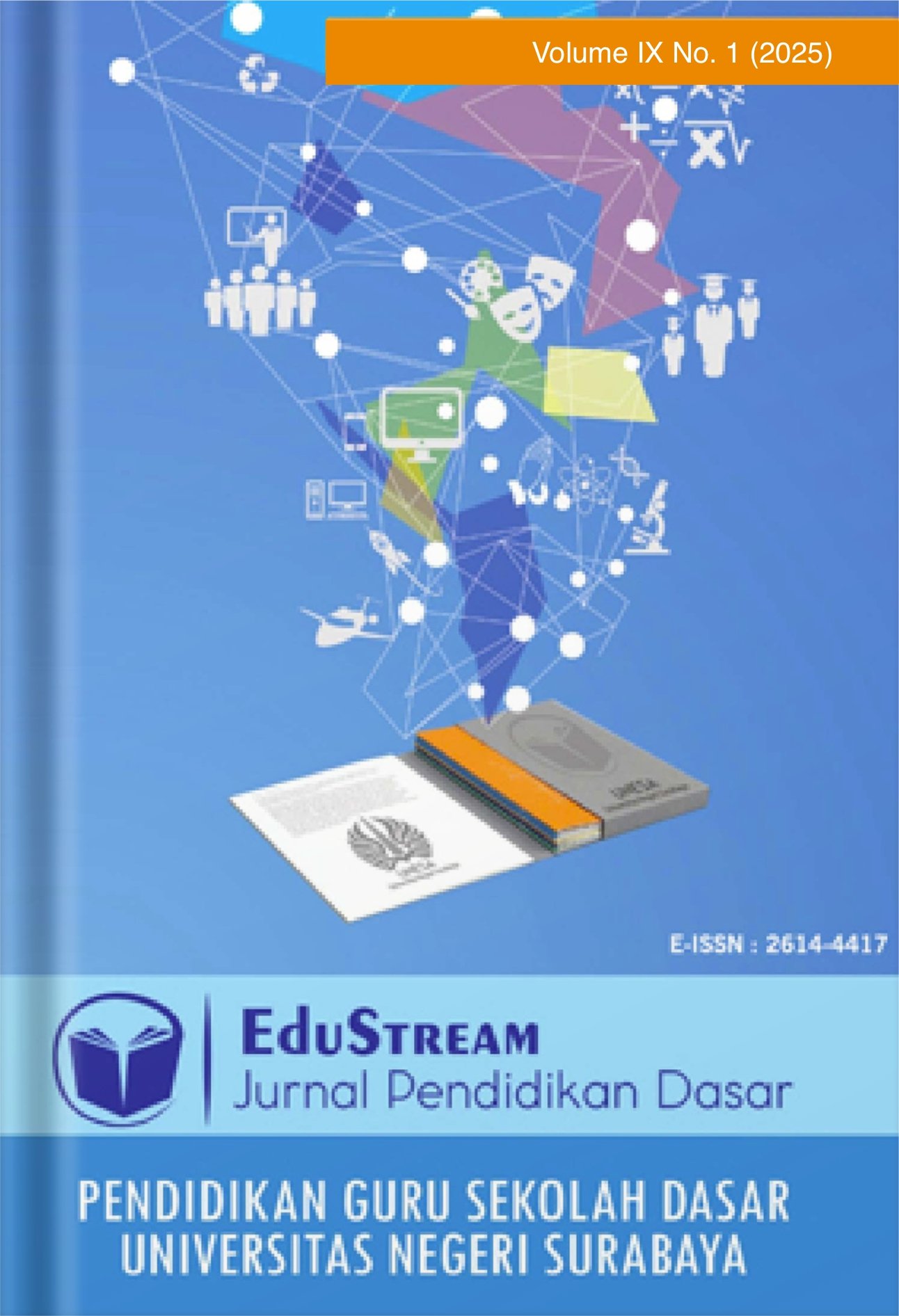Fostering digital literacy awarness in support of suistanable development goals (SDGs) among elementary school student: A literature review
DOI:
https://doi.org/10.26740/eds.v9n1.p58-64Keywords:
Digital Literacy, Development Sustainable, Elementary EducationAbstract
In today’s increasingly digital society, the ability to navigate, evaluate, and effectively use digital information known as digital literacy had become an essential skill for students, including those at the elementary school level. However, fostering digital literacy awareness among elementary school students presented unique challenges, particularly due to developmental, pedagogical, and contextual factors. This study aimed to explore the state of digital literacy among elementary students and examine various strategies for building awareness and foundational skills in this area. This review synthesized findings from recent empirical and theoretical studies, focusing on the integration of digital tools, the role of teachers, curriculum design, and parental involvement. It highlighted the importance of age-appropriate learning approaches that combined guided exploration with the development of critical thinking. Furthermore, it emphasized the need for a comprehensive approach to digital literacy in schools, including consistent education on digital ethics and safety across all subjects. The main findings showed that early and structured exposure to digital media, when guided by competent educators and supported by inclusive policies, significantly enhanced students’ digital literacy awareness. The literature also indicated that teacher professional development and collaboration with families were crucial to sustaining effective practices. In conclusion, fostering digital literacy awareness in elementary education required a multi-dimensional approach involving teachers, parents, curriculum innovation, stakeholder engagement, and policy alignment. Future research needed to examine context-specific interventions and long-term impacts to formulate sustainable strategies.
References
Adhani, R. N., Rahmawati, V., & Rachman, I. F. (2024). Meningkatkan Kesadaran Digital: Peran Literasi Digital Dalam Merespon Masalah Moral dan Ketimpangan Sosial Menuju Pencapaian SDGS 2030. Jurnal Ilmiah Pendidikan Kebudayaan Dan Agama, 2(3), 107–114.
Aji, S. D., Yasa, A. D., Dewi, P. K., Kumala, F. N., & Putri, A. N. (2022). Development of e-module flipbook on science learning to support sustainable development goals (SDGS) for elementary school students. QALAMUNA: Jurnal Pendidikan, Sosial, dan Agama, 14(2), 895–906.
Bälter, K., Abraham, F. J., Mutimukwe, C., Mugisha, R., Osowski, C. P., & Bälter, O. (2022). A web-based program about sustainable development goals focusing on digital learning, digital health literacy, and nutrition for professional development in Ethiopia and Rwanda: Development of a pedagogical method. JMIR Formative Research, 6(12), e36585.
Castro, G. D. R., Fernandez, M. C. G., & Colsa, A. U. (2021). Unleashing the convergence amid digitalization and sustainability towards pursuing the Sustainable Development Goals (SDGs): A holistic review. Journal of Cleaner Production, 280, 122204.
Hamadeh, S. A. (2022). How Gen Z can improve community literacy about the 17 SDGs? A realistic approach to construct a futuristic change-maker paradigm. Green Technology, Resilience, and Sustainability, 2(1), 2.
Koebe, P. (2025). How digital technologies and AI contribute to achieving the health-related SDGs. International Journal of Information Management Data Insights, 5(1), 100298.
Madon, S., & Masiero, S. (2025). Digital connectivity and the SDGs: Conceptualising the link through an institutional resilience lens. Telecommunications Policy, 49(1), 102879.
Martínez-Bravo, M. C., Sádaba Chalezquer, C., & Serrano-Puche, J. (2022). Dimensions of digital literacy in the 21st century competency frameworks. Sustainability, 14(3), 1867.
Masyhura, N., & Ramadan, Z. H. (2021). Implementation of digital literacy in elementary schools. International Journal of Elementary Education, 5(2), 123–130.
Mondejar, M. E., Avtar, R., Diaz, H. L. B., Dubey, R. K., Esteban, J., Gómez-Morales, A., ... & Garcia-Segura, S. (2021). Digitalization to achieve sustainable development goals: Steps towards a smart green planet. Science of The Total Environment, 794, 148539.
Ramadani, N., Febrianti, S. D., & Rachman, I. F. (2024). Optimalisasi literasi digital oleh pemerintah untuk mendukung agenda SDGs Goals-17: Partnership for the goals. Semantik: Jurnal Riset Ilmu Pendidikan, Bahasa dan Budaya, 2(2), 218–229.
Ricoy, M. C., & Sánchez-Martínez, C. (2022). Raising ecological awareness and digital literacy in primary school children through gamification. International Journal of Environmental Research and Public Health, 19(3), 1149.
Saini, M., Sengupta, E., Singh, M., Singh, H., & Singh, J. (2023). Sustainable Development Goal for Quality Education (SDG 4): A study on SDG 4 to extract the pattern of association among the indicators of SDG 4 employing a genetic algorithm. Education and Information Technologies, 28(2), 2031–2069.
Sari, G. I., Winasis, S., Pratiwi, I., & Nuryanto, U. W. (2024). Strengthening digital literacy in Indonesia: Collaboration, innovation, and sustainability education. Social Sciences & Humanities Open, 10, 101100.
Shafira, N. A., Dewi, Y., & Hakam, K. A. (2023). How digital literacy can drive inclusive progress towards the 2030 SDGs. Advances in Economics, Finance and Sustainability, 5(1), 15–28.
Widiyantti, D., Fadila, D., Pratiwi, N., & Rachman, I. F. (2024). Peran literasi digital pada siswa sekolah dasar untuk pencapaian sustainable development goals (sdgs) 2030. Morfologi: Jurnal Ilmu Pendidikan, Bahasa, Sastra dan Budaya, 2(3), 142–155.
Yamamoto, S. (2023). Digital SDGs framework towards knowledge integration. In Virvou, M., Saruwatari, T., & Jain, L. C. (Eds.), Knowledge-Based Software Engineering: 2022. JCKBSE 2022. Learning and Analytics in Intelligent Systems (Vol. 30). Springer, Cham.
Yetti, E. (2024). Pedagogical innovation and curricular adaptation in enhancing digital literacy: A local wisdom approach for sustainable development in Indonesia context. Journal of Open Innovation: Technology, Market, and Complexity, 10(1), 100233.
Downloads
Published
How to Cite
Issue
Section
License
Copyright (c) 2025 EduStream: Jurnal Pendidikan Dasar

This work is licensed under a Creative Commons Attribution-ShareAlike 4.0 International License.
Authors who publish with this journal agree to the following terms :
The articles published in this journal are protected by copyright. The copyright remains with the authors of the articles, but the publishing license is held by Universitas Negeri Surabaya as the journal manager. This license, Creative Commons Attribution-ShareAlike (CC BY-SA), allows readers to copy, distribute, and adapt the work, provided that proper attribution is given to the original author and any modified work is published under the same license. This license grants the freedom to use the work both commercially and non-commercially, as long as it adheres to the terms outlined in the license.
 Abstract views: 227
,
Abstract views: 227
, PDF Downloads: 171
PDF Downloads: 171

















